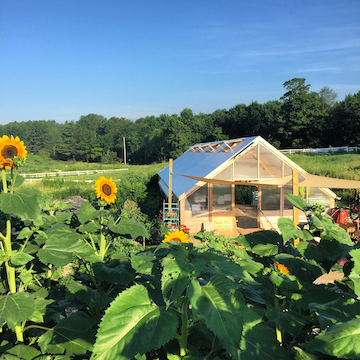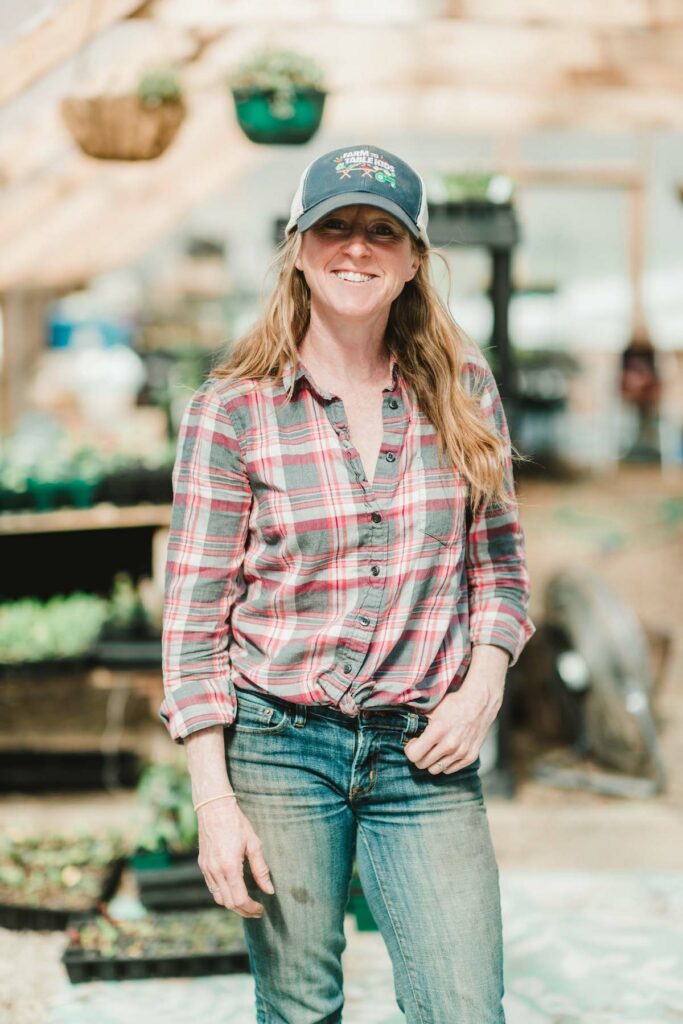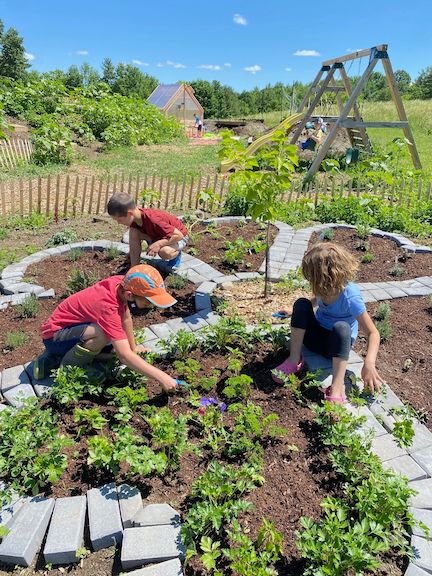By Pete Salmansohn
On a sunny mid-June morning a group of young children, under the guidance of farmer Stephanie McDonough, are exploring the world of radishes. “They seem to love pulling them out of the ground more than they like eating them,” she says. “But that’s ok. I call it ‘harvest therapy’ … getting their hands in the soil and seeing what nature can give them. Like a treasure hunt.”
At Farm to Table Kids summer camp in North Yarmouth, Maine, the learning is a kind of inspired osmosis transmitted through McDonough’s heartfelt passion for gardening and her joyful personality.
“Hey everyone, come on over and smell what Emily has. Dill! Who likes that smell?” asks McDonough. A bunch of hands go up. “Isn’t it great?” she says. “I love it! We’re going to need some dill to make pickled radishes, so take a small handful of the leaves and put them in this baggie.” She then demonstrates how to appropriately pick the dill so the plant isn’t damaged.
Located on several acres of historic Skyline Farm, in partnership with Royal River Conservation Trust, the camp offers an air of freedom, fun, learning and wonderful engagement. Later that day, I asked Audrey Knowles, a 10-year-old junior farmer, why she was at Farm to Table Kids. She was not at all hesitant in her response. “This camp is awesome,” says Knowles. “The very first time I came here I liked it and wanted to be here all the time. You get to spend a lot of time in nature and dirt, and that’s what I like to do … nature and dirt!”

Over the next nine weeks, I visited the camp five more times and soon became familiar with a basic, though seasonally fluctuating, daily schedule. Between 15 and 25 kids, ages 5 to 12, arrive each weekday morning at 9 a.m. Many soon run from the parking lot to a shed to stow their backpacks and then wheel down a hill to join their fellow campers and counselors by a big greenhouse and crafting tables. Before the morning meeting, some kids play in the hilly sunflower maze, ride on the swings, chase each other or sit at the picnic tables and work on weaving friendship bracelets out of embroidery thread.
McDonough, an exuberant and loving supporter for all things natural and free, soon calls the campers together and goes over the day’s schedule and the choices the kids will have. One morning she asks, “Are you feeling Mother Nature right now?” “If not,” she says, “then we need to all get up and move. Let’s twist out any sleepiness.” Twenty-five small bodies then stretch into yoga positions on a grassy area as they take their lead from McDonough and her three to four counselors.
A few minutes later McDonough announces, “Here are your choices for the next hour or so. Sarah will be taking a group up to play in the forest and the stream. Sam will be leading crafts right here and today she’ll be showing you how to make felted soap. And I’ll be going to the garden and will need some helpers to pick peppers, kale, chard and some garlic scapes for the pickled radishes.” The kids then break into self-selected groups and off they go.

Farm to Table Kids is the creation of McDonough, 42, who grew up with five siblings in a working class family in Woburn, Massachusetts, where, she says, “we ate farm to table, and gardening was built in as a way of life.” Her father was a full-time fireman for the city and her mother was what McDonough calls a “homesteader.” Additionally, a great uncle had started McCue’s Garden Center back in 1933, and McDonough spent a lot of time there with her cousin, helping out during the Christmas tree and wreath season. (The nursery was just named “Best of Boston” for 2021 by Boston Magazine.)
Despite these very earthy beginnings, McDonough’s influential feminist grandmother wanted her to go beyond their little world and “work in the city and get a corner office, making real money.” After earning a bachelor’s in sports management from the University of Massachusetts at Amherst, McDonough was well prepared to work in that field and did so successfully for a number of years, including a stint with the National Basketball Association (NBA) and Vail Resorts. In 2010, she gave birth to her first child, Autumn, and in her retirement from the corporate world, she started farming again. She also started teaching what she knew. “Little by little and then more and more,” says McDonough.
Her second child, Joey, was diagnosed with stage-four cancer when he was only 3 and a half years old. “We were in very thick woods during all of 2015 and ‘16 and even on into 2017,” she says, “but we were finally able to dream about life outside the hospital walls later that year.” In fact, she was able to begin the first summer camp sessions in the summer of 2017.
The goal of the now-incorporated Farm to Table Kids is “to empower children with an appreciation for local agriculture so they may find what lights their heart: as farmers, chefs, artisans, consumers, and community members.” During the five days of a camp session, each child has a chance to take on a number of roles.
For instance, one afternoon each week is spent on what McDonough calls the “Chopped Challenge,” which takes its name from a popular show on the Food Network. Each group of about four or five campers gets a basket of freshly picked vegetables and herbs and is asked to come up with a dish or two to be showcased on the “presentation table.” Thus ensues a short period of frenzied activity, in which decisions are loudly made and unmade in a messy semi-democratic manner. Some 30 minutes later, salads, kale chips, blended vegetable drinks and other inventions are put before a panel of young judges who have the difficult job of selecting winners from among their peers.
On another day of the week, the kids, counselors and McDonough busily prepare for “Farmstand Friday” — a learning experience on business practices. The kids pick and wash vegetables, sort herbs, make signs, organize display tables, greet parents and visitors and, very excitedly, handle the money from produce sales.
Planning for the gardens that the organically grown produce comes from starts months before. McDonough thinks about the crop plan and garden layout the previous season, in late summer. She begins seeding flowers, fruits and vegetables, like tomatoes, lettuce, chard, corn, cucumbers, melons and peppers, as early as February. “I can’t go anywhere when all these seeds and seedlings need misting and maintenance,” she says. “It’s a huge commitment, and a really, really big process. I’m very proud of this, but I definitely need my family to show a lot of patience when it’s happening. Taking care of those tiny plants is like taking care of children; you can’t just leave and take a vacation.”
During mid-spring, seniors from Greeley High School in Cumberland help her plant gardens such as the “sunflower forest.” When the younger kids arrive later in the season, she tells them that the older kids helped. “They can aspire to maybe doing this one day themselves,” says McDonough.
McDonough also runs an April vacation camp for a week. During that time, she and the campers plant brassicas and other cold-hardy crops, while also working in the greenhouse to get other plants ready for the summer camp sessions.
Although there has always been a significant number of kids who come back every year, a junior farmer program was started in 2021 to enrich and build their engagement. These youngsters, typically 11 or 12 years old, help the older counselors run activities and help out in the gardens.
One morning an 11-year-old from Cumberland coaches some younger kids on how to weed the lettuce patch. “I’ve got to show them what are weeds and what’s not,” she says. “This is basil, you guys. Smell it. It’s not a weed.”
Another junior farmer, 11-year-old Emma Stein, explains to a camper what a weed is. “A weed,” she says, “steals energy from the plant you’re trying to grow, and if the weed gets too big, the plant dies.”
Counselor Sara Robinson, now a senior at Greely High, thinks the campers benefit from their farm camp experience. “I think the kids get a sense of community, especially after the pandemic,” Robinson says. “They get to have a sense of normalcy here, they get to play, they get to be outside. For a year and a half they’ve been mostly inside. I don’t think they actually know what they’re learning in nature, but you should hear them talk to their parents. They say things like ‘Mom, you should see what I made today out of flowers. Mom, try this sun butter. We made it right from the sunflowers.’”
I asked a variety of kids, age 6 and older, what they thought of camp and “Farmer Steph,” and I heard the following:
“I’ve never seen her mad.”
“No one can make a mistake here.”
“There’s something here for everyone.”
“She gives you choices; there’s a lot of freedom here.”
“She’ll make you brighten up, she’s so enthusiastic.”
Another counselor, Samantha Goldberg, who is a freshman at Hobart and William Smith Colleges, leads one of the many crafting activities that go on at camp. “There are a lot of plants that have a really cool smell, a bold smell,” she tells her group, “like mint and lavender and rosemary. And we’re going to pick some to use with our candle-making so they smell nice.” Each child gets a small glass jar and stuffs the herbs into it, adds a little olive oil and then fills it mostly with water and finally places a small votive-type candle to float on top. “When you light it,” Goldberg tells her young charges, “the heat will activate the herbs and oil, and you’ll get some nice smells.”

While all of this work and fun with the campers is going on, a tireless 31-year-old experienced farmer, Kiersten Savage from Augusta, is out in the flower and vegetable gardens doing all the necessary hard work to keep the crops healthy and productive. She typically spends 12 hours a week at the farm, including maintaining a popular Community Supported Agriculture (CSA) program. Savage cuts and arranges dahlias, sunflowers, snapdragons and cosmos in lovely bouquets which wind up in large water-filled vases at the farm stand alongside the road bordering the property. McDonough says, “She shows up on June 1 and starts rocking it full time.”
One afternoon while a group of campers builds dams on a little creek and searches for minnows, McDonough takes seven or eight kids to the garden to place bamboo stakes to support the many fledgling Lunchbox pepper plants. One child sees a ladybug and asks, “Are ladybugs bad?” McDonough replies, “No, they eat the bad bugs.”
A young boy then spots a big glistening worm and announces loudly to his friends, “Worm poop is very nutritious for the soil and helps the plants grow.” As the group finishes their gardening tasks and returns to the crafting tables, several girls run excitedly over to them to display their pressed flower mobiles which they made out of paper plates, yarn, contact paper and colorful flower petals. “Hey,” says one young gardener, “I want to do that!” “That looks nice,” says another. They quickly disappear into the greenhouse in search of mobile-building materials.
McDonough hopes that each child at Farm to Table Kids makes a connection with the natural world during their weeklong camp experience.
She knows that not every kid will grow up and become an organic farmer. “I feel my role is [to] shine the light on all the gifts that come from Mother Nature and growing [plants], whether it’s picking and making flower bouquets, or crafting with nature, or using our outdoor greenhouse to make farm-to-table snacks, or setting up and helping with our farm stand,” says McDonough. “It lights my heart to help a child find a place of belonging in nature. And what they learn here, they bring home to their families.”
Pete Salmansohn is an award-winning environmental educator and journalist who spent 39 summers working for National Audubon Society in Maine’s Muscongus Bay. You can see more of his writing at puffinpete.net.
